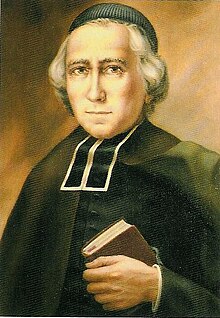Marian lay communities
The Marianist Lay Communities (MLG) ( en . : Marianist Lay Communities (MLC); it . : Comunità Laiche Marianiste (CLM); es . : Comunidades Laicas Marianistas (CLM)) are Roman Catholic lay organizations that live in small communities, the members are committed to missionary work . The lay congregations were united under an international leadership in Santiago de Chile in 1993 and in 2000 recognized by the Holy See as an international association of believers under papal law. They have around 7,000 members worldwide and are represented in 34 countries.
history
For the century in 1800 was France , the secularization well advanced. In order to offer the lay faithful a forum , the French clergy gathered around themselves believing lay people who were willing to form lay groups within the secularized society. In the years 1800–1820, communities of lay believers emerged who wanted to live their spirituality and founded churches for this purpose . From this situation, these models quickly spread across the borders of France.
Marian family
The “Marian family” traces its origins back to the Marian communities founded by Abbé Guillaume-Joseph Chaminade (1761–1850) at the beginning of the 19th century in Bordeaux . In 1996 the World Council of the Marian Family is founded, which now consists of four branches:
- The earlier "Marianist Apostolic Groups" (MAG), which were initially established as a religious community in 1801 , developed into a lay community and since 2000 have been called "Marianist Laiengemeinden" (MLG).
- The second branch is called "Alliance Mariale" (AM), it was founded in 1808 and developed into a secular institute .
- The "Marianist Sisters" (FMI) were founded in 1816 and form the female religious community.
- As the last branch was 1817 Congregation of Marianists (SM) established the monks and priests form the male branch of the order.
Marian lay communities
In 1993, the worldwide scattered lay congregations met for the first time in Santiago de Chile and developed an international leadership structure. In 1996, the four branches of the Marian Family were united, each under their own leadership, and set up an international governing body. The Marian lay communities received their decree of recognition from the Pontifical Council for the Laity on March 25th and were included in the official list of associations of the faithful .
Self-image
The members dedicate their lives to the "mission of the Church in the world". They have chosen Mary , the Mother of God , to be their protector and guide , who is their role model and educator. In the name of Mary they want to put the word of the Lord into practice, for this they lean on the community life lived according to the early Christian character, they live and work in small communities.
Organization and expansion
The MLG is divided into local groups, national groups and regional groups. Each group level is led by an individual or a committee . There is the regional group Africa , Asia , North America and Europe / South America . The general assembly takes place every four years and elects an international governing body. It consists of a president, the regional representatives for Europe, Latin America, Africa and North America / Asia, and a spiritual advisor . The headquarters are in Fairview ( Indiana , USA ), the communities are represented in 34 countries and distributed as follows: Africa (7), Asia (5), Europe (7), North America (6), Oceania (1) and South America (8 ).
The logo of the lay community consists of the Marianist cross and is supplemented with a C (Comunità = community) on the left above the horizontal crossbar and an L (Laicas = lay people) on the right.
literature
- The Spiritual Communities of the Catholic Church - Compendium (No. 38, Marianistische Laiengemeinden, pp. 119–121), St. Benno-Verlag , Leipzig , 204, ISBN 3-7462-1995-7
Web links
- International website CLM (multilingual)
- Web presence of the Marianists in Austria: The Marianist Family
- Pontifical Council for the Laity: Comunità Laiche Marianiste (Italian)


